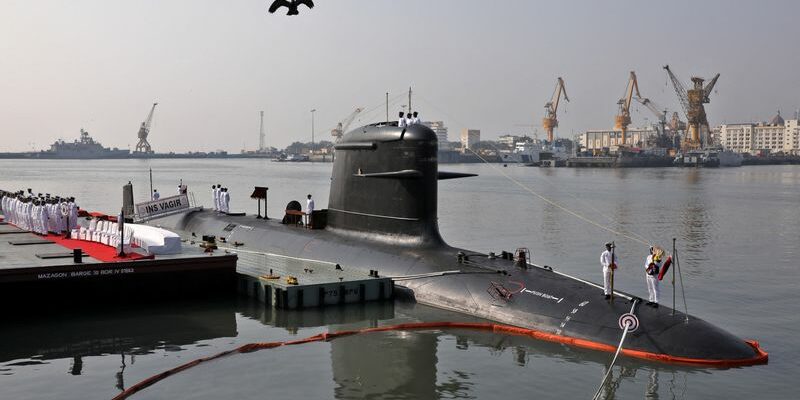by Rupam Jain, Andreas Rinke and Krishn Kaushik
NEW DELHI/BERLIN (Reuters) – Germany will seek a $5.2 billion deal with India to jointly build six conventional submarines in the country during Chancellor Olaf Scholz’s visit on 25-26 February, according to two Indian and two German sources.
This naval project is the latest attempt by a Western military power to convince New Delhi to reduce its dependence on Russia for its military equipment.
India is struggling to replace its aging submarine fleet, with 11 of the 16 conventional submarines over 20 years old, and to counter China’s growing presence in the Indian Ocean.
The Indian Navy also has two locally made nuclear-powered submarines.
Prime Minister Narendra Modi’s government wants to see India, one of the world’s biggest arms importers for decades, produce more weapons domestically in collaboration with foreign partners.
The submarine construction project, for which ThyssenKrupp Marine Systems (TKMS) is one of two international bidders, will be discussed between the two countries during the German Chancellor’s visit to India and Berlin will support the agreement, according to a source.
As part of this agreement, a foreign manufacturer will have to partner with an Indian company to build the submarines on its territory.
It will also have to transfer technology for anaerobic propulsion systems (AIP or Air Independent Propulsion in English) using fuel cells, a particularly thorny condition for most foreign companies.
The French group Naval Group had withdrawn from the project on the eve of Narendra Modi’s visit to Paris in May 2022, citing its inability to meet the conditions set by the Indian government in 2021.
Russia’s Rosoboronexport and Spain’s Navantia Group are also out of the running, said an Indian defense ministry source who wished to remain anonymous as she is not authorized to speak to the media.
The German TKMS, which has just signed a contract for the joint construction of six submarines with Norway, and the South Korean Daewoo Shipbuilding and Marine Engineering remain in the running.
India’s foreign and defense ministries did not respond to requests for comment. The German government and TKMS declined to comment.
According to an Indian diplomatic source, the country has asked Germany for assurances of joint manufacturing of the submarines, not just supply support.
Another Indian Foreign Ministry official said “Scholz was determined to reinvigorate trade and defense ties with India.”
Such a deal would likely find support from the German government, officials in Berlin said. Although the decision is not official, the coalition government relaxed the arms export policy for India and authorized the export of a set of military equipment in early February.
“We would like to continue to do so,” said a German government official. “India is largely dependent on Russian weapons. It cannot be in our interests for that to continue.”
(Reporting Rupam Jain and Krishn Kaushik in New Delhi, Andreas Rinke in Berlin; French version Dagmarah Mackos, editing by Kate Entringer)
©2023 Thomson Reuters, all rights reserved. Reuters content is the intellectual property of Thomson Reuters or its third party content providers. Any copying, republication or redistribution of Reuters content, including by framing or similar means, is expressly prohibited without the prior written consent of Thomson Reuters. Thomson Reuters shall not be liable for any errors or delays in content, or for any actions taken in reliance thereon. “Reuters” and the Reuters Logo are trademarks of Thomson Reuters and its affiliated companies.
